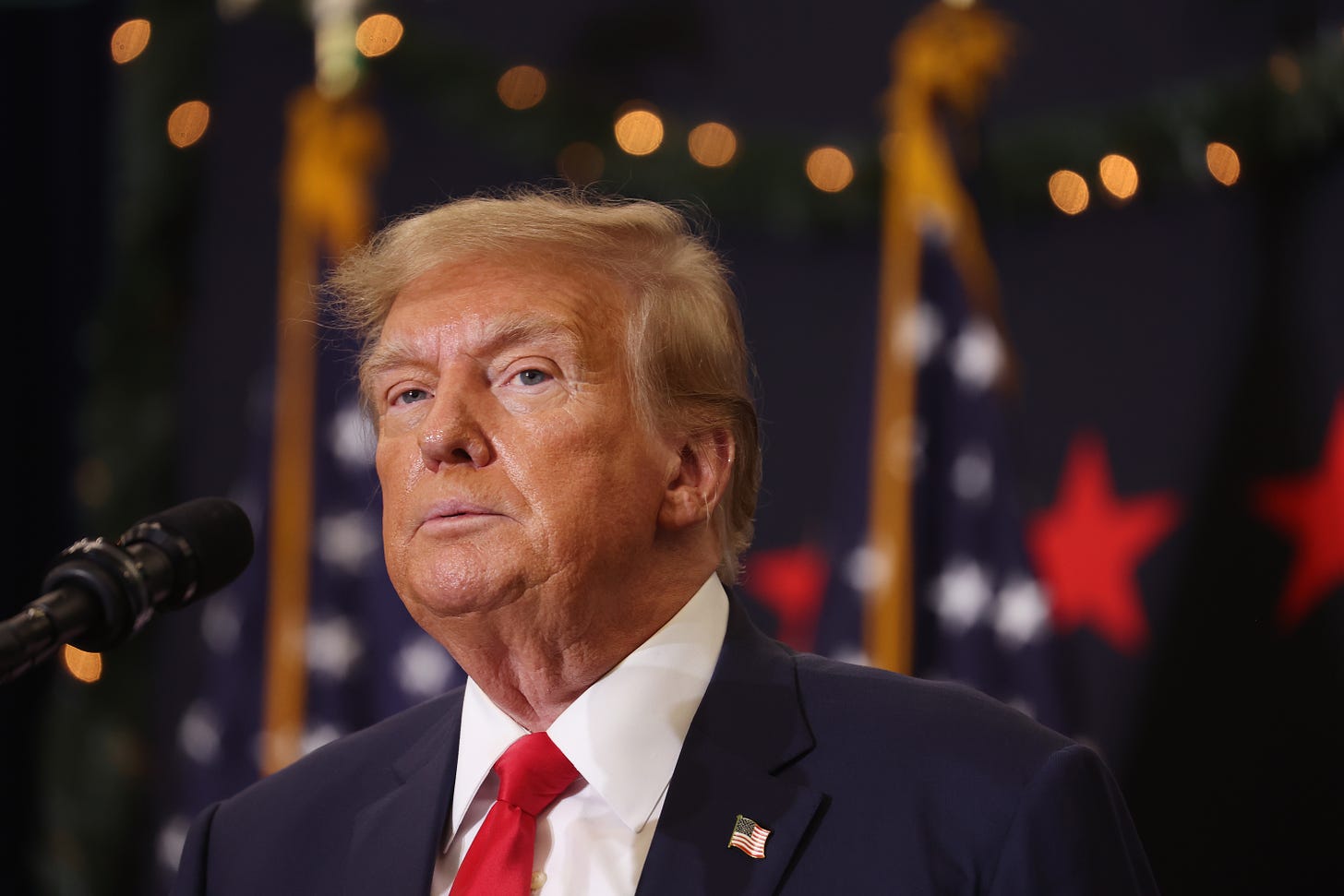Jack Smith’s Gut-Punch to Trump’s Bid for Delay
“This case implicates constitutional bedrock.”

[Editor’s note: Within hours of the publication of this article on December 22, 2023, the Supreme Court denied certiorari—rejecting the special counsel’s request for expedited review of Trump’s immunity claims.]
IN A U.S. SUPREME COURT FILING YESTERDAY, Special Counsel Jack Smith delivered a body blow to Donald Trump’s prospects for delaying his federal prosecution charging a criminal conspiracy to overturn the 2020 election.
Smith’s haymaker came by way of a masterful ten-page brief replying to Trump’s own response to Smith’s petition for an expedited Supreme Court review of a question of national magnitude: Whether Trump is immune from prosecution as a former president for crimes committed while in office.
Trump’s opposition brief admits that the question deserves Supreme Court review . . . but only after the federal appeals court takes time to rule.
“Haste makes waste,” the brief stated. Literally. It actually says that.
As everyone not named “Rumpelstiltskin” knows, Trump’s strategy to escape accountability is delay. If his federal criminal trial in Washington doesn’t occur before the election and he gets voted back into the White House, he’ll have his new attorney general dismiss the prosecution. Or he’ll pardon himself.
Smith’s new brief stresses the nation’s need for speed. “This Court’s immediate review,” Smith writes, “is the only way to achieve [a] timely and definitive resolution” of a question of monumental constitutional significance.
In other words, expedited review is the whole ball game.
In four ways, Smith’s brief exemplifies stellar Supreme Court advocacy.
1. Smith uses historic precedent
It’s hard to miss Smith’s message to the Court: The nation needs you to act now.
Smith’s language, of course, is that of an experienced advocate. “This case implicates constitutional bedrock,” he writes. Quoting the most famous line from Marbury v. Madison, the seminal 1803 opinion of Supreme Court Chief Justice John Marshall, Smith states:
On foundational questions such as this, it is “the province and duty” of this Court alone to definitively “say what the law is.” [Emphasis added.]
Put another way, the case cries out for the Court’s resolution. With the criminal proceedings paused in the district court pending Trump’s appeal of his immunity claim, and with the clock ticking on the scheduled March 4 trial date, there’s every reason not to squander weeks or months waiting on a mid-level appellate decision that will not be the final word.
For that point, Smith relies heavily on what is arguably the most important political case of the twentieth century, the White House tapes case of President Richard Nixon, which the Court speedily decided with no decision from the court of appeal:
United States v. Nixon supports [immediate Supreme Court review.] There, the criminal trial of the Watergate conspirators (other than President Nixon) lay four months in the future. . . . The Court granted certiorari before judgment and expedited briefing, resolving the case 16 days after argument.
Jack Smith gets it: When you are arguing a historic case, cite historic cases of the first order.
2. Smith uses Trump’s pleadings against him.
Good advocates take advantage of their adversary’s mistakes.
The public, Smith writes, has a powerful interest in speedy resolution of criminal charges, an interest that’s heightened where a former president is charged with crimes against the nation. The coup de grâce, however, is Smith highlighting Trump’s ridiculous litigation tactics to defeat that public interest:
[Defendant] has sought extraordinary delay. When the district court requested the parties’ positions on a trial date, respondent proposed to begin trial in April 2026.
That absurd proposal gave Smith the absolute best evidence of what Trump’s opposition to a prompt Court ruling on immunity is all about.
3. Smith takes the high road
At the 2016 Democratic convention, Michelle Obama delivered her famous line, “When they go low, we go high.” She later explained: “It’s easy to be divisive. . . . Our responsibility in [this life] is so much bigger than us.”
When in the Supreme Court, it’s best to emphasize one’s bigger purpose.
Perhaps you’ve heard—Trump favors “going low.” His Wednesday opposition brief yields to his impulse for divisive attack, grievance, and self-promotion:
[The Special Counsel] confuses the “public interest” with the manifest partisan interest in ensuring that President Trump will be subjected to a months-long criminal trial at the height of a presidential campaign where he is . . . the only serious opponent of the current Administration.
Smith, rather than taking the bait, stays above the political fray:
The Nation has a compelling interest in a decision on respondent’s claim of immunity from these charges—and if they are to be tried, a resolution by conviction or acquittal, without undue delay. [Emphasis added.]
He repeats the point for emphasis: “The government seeks this Court’s resolution of the immunity claim so that those charges may be promptly resolved, whatever the result” (emphasis added). That kind of argument appeals to justices’ sense of the Court’s own higher purpose.
4. Smith didn’t say what he didn’t have to.
Artful legal advocacy also includes knowing what need not be said.
Smith did not have to tell Supreme Court justices what they surely know from the news:
that the government’s evidence against Trump is overwhelming, so if he’s tried before the election in D.C. he will likely be convicted; and
if that happens, Trump’s prospects in a general election drop like a stone.
On November 6, a New York Times/Siena poll showed that Trump’s reported lead in five of six states flipped when respondents were asked what would happen if he were convicted. On December 20, the same polling group reported that even a third of Republicans think Trump should not be president if he is found guilty.
Jack Smith’s brief never mentions the 2024 campaign or election. It’s obvious to anyone who’s politically aware that voters deserve to have full information before they cast their ballot—especially about a candidate’s innocence or guilt of crimes charged by a grand jury.
The special counsel has won the battle of Supreme Court briefs. While there’s no safe predicting what the Court will decide, one could do worse than placing their money on Jack Smith.





